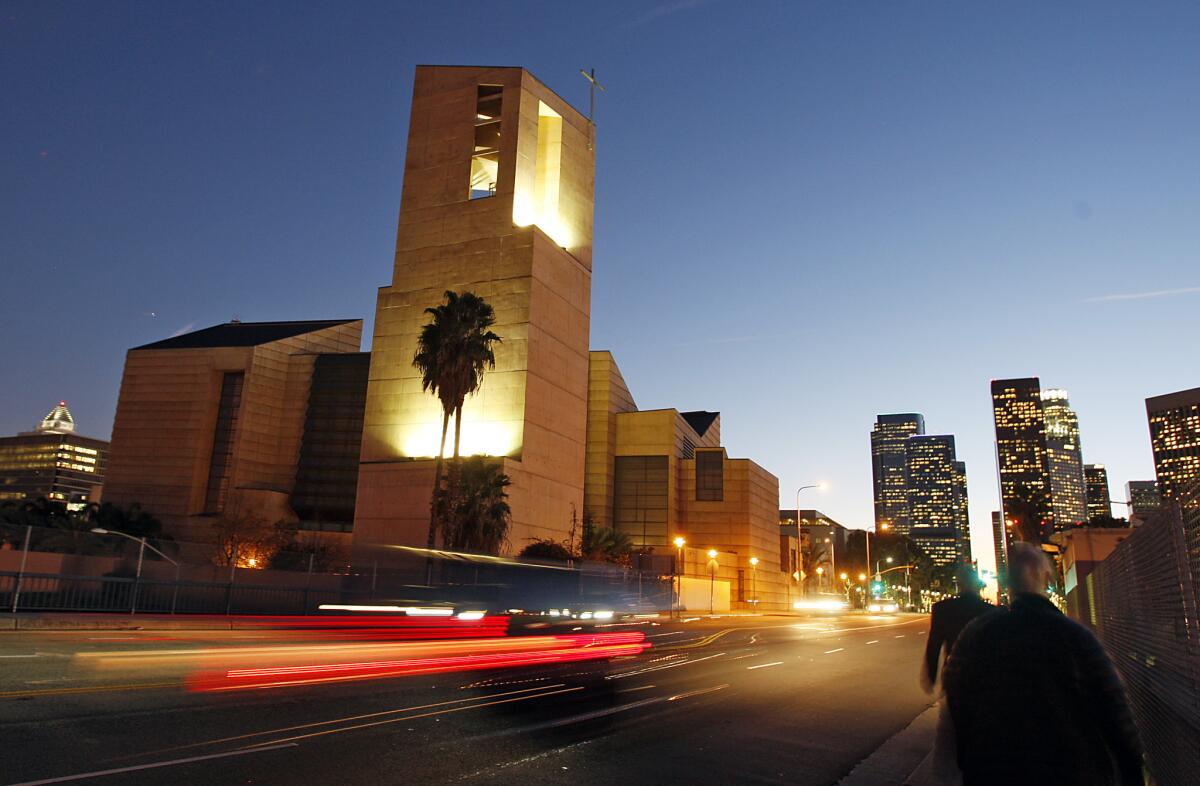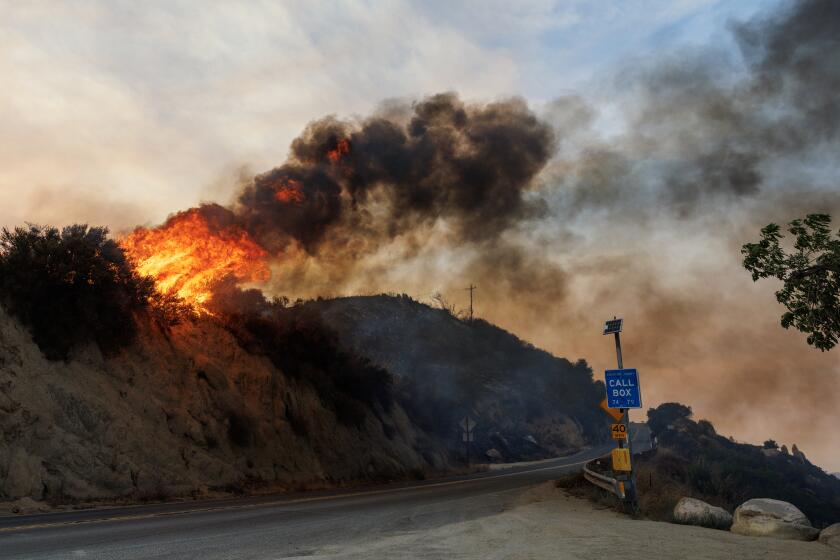L.A. Archdiocese is steps ahead of Catholic debate over homosexuality

Tim Swift went to Catholic schools, attended a Jesuit university and sent his children to parochial schools.
Now a lawyer in Santa Ana, Swift saw it as a progressive move when cardinals and bishops meeting in Rome last month issued a draft document that included a more sympathetic and welcoming attitude toward gays and lesbians.
Then came a conservative backlash in Rome and the synod retreated, erasing the language that would have been a major shift in the church’s attitude toward homosexuality.
“I know they backed off on it, but I view it as they’re pushing for change,” he said. “The message is we need to change our thinking on this, and they’re laying the foundation for ultimate change.”
The debate roiling the worldwide Catholic Church is largely a moot point in the Los Angeles Archdiocese, which includes Los Angeles, Ventura and Santa Barbara counties.
The local archdiocese began its ministry for gay, lesbian, bisexual and transgender people in 1986, making it the oldest ministry of its type in the country.
It has served as a model for dioceses in Chicago, Atlanta and elsewhere.
But for local Catholics, the debate at the Vatican is highly significant.
“The LBGT genie is now out of the bottle,” said Frank McKown, co-chair of the Los Angeles Archdiocese’s Catholic Ministry with Lesbian and Gay Persons.
He said that changes in the attitudes of Catholics — both in Los Angeles and nationwide — moved with changes in society. His ministry helps churches throughout the nation’s largest archdiocese establish outreach groups for LGBT Catholics and their parents. He said he tries to teach people that being gay or lesbian “isn’t a choice but an orientation and that we are all God’s children.”
“There’s more acceptance of LGBT as more gay people come out to neighbors and friends and families,” McKown said.
But while U.S. and western European Catholics have become more tolerant of gays, church officials in Africa, Asia and Latin America remain hostile, sometimes supporting anti-gay laws.
McKown said he still encounters anti-gay sentiment at home. “We get it all the time,” he said. “We see it even among clerics at the highest order.”
McKown said he received a call from a woman in Santa Clarita last week asking whether his ministry taught that homosexual acts are a sin.
“I said, ‘Yes we do, that’s what the church teaches, but it doesn’t mean ostracize people or marginalize people or treat them with hostility or venom.’”
At Our Lady of the Angels in downtown Los Angeles, many parishioners expressed support for making gays feel more welcomed in the church.
“We took one step forward and two steps back,” said Rose Hernandez. “That’s not right.”
Bridget Alario, who was headed to Mass at American Martyrs Church in Manhattan Beach, said she found nothing bothersome in the first draft.
“The church is frustrated at the lost lambs and it wants them back,” she said. “We’re losing our people to the culture wars and the church has to delicately find a way to communicate that her message of morality is a message of love, not hate, not rules, rules, rules.
“And at the synod,” she added, “that’s what they’re dancing around.”
Donna MacEachern said parishioners at American Martyrs sing a hymn with the words, “All are welcome in this place.”
“I don’t think we’re not accepting here,” she said.
The synod’s draft seemed to signal an open door to homosexuals, declaring that they “have gifts and qualities to the Christian community.” It also asked, “Are we capable of welcoming these people, guaranteeing to them a fraternal space in our communities?”
That language was stripped from the final document when it failed to gain the support of two-thirds of the synod, a body of bishops, priests and lay people who advise the Vatican. Of the 180 members, 118 voted in support. The synod likewise failed to pass proposals to study more closely an end to the prohibition on communion for divorced Catholics who remarry.
The original language faced a backlash from conservative Catholic leaders, who saw it as inconsistent with church teachings. One of the most outspoken opponents was American Cardinal Raymond Burke, who said the changes “cannot be allowed.”
“There’s a confusion with regard to the question of people who are living in de facto unions, or people who are attracted to the same sex and are living together, and an inadequate explanation of the relationship of the church to the person,” he told reporters.
Still, Francis DeBernardo, executive director of New Ways Ministry, a Maryland-based nationwide group that began pushing for acceptance of gays in 1977, doesn’t see what happened in Rome as a definite setback for gays.
“It would have been great if they had kept the positive language … but I really think this isn’t the last statement,” DeBernardo said. “This is the first statement.”
McKown said the draft did not entail a change in church teaching. “What is revolutionary is the tone,” he said. Gone, he said, was the characterization of homosexuality as “intrinsically disordered.”
Chris Ponnet, a priest who is spiritual director of the Los Angeles Archdiocese’s lesbian and gay ministry, said the draft was similar to a statement from the U.S. Conference of Catholic Bishops in 1997 “that gay and lesbian people have a right to be part of the church and listened to by the church.”
Both McKown and Ponnet said that Catholic teaching is accepting of homosexuals but not homosexual sex. The church prohibits sex outside marriage, so it would take a major shift in church doctrine to endorse gay sex, one that probably would include acceptance of premarital sex and masturbation.
The issue of gays and the church is expected to be discussed at a larger synod next October.
[email protected]
Twitter: @gottliebjeff
More to Read
Sign up for Essential California
The most important California stories and recommendations in your inbox every morning.
You may occasionally receive promotional content from the Los Angeles Times.











